Kenya parks & attractions
Amboseli National Park
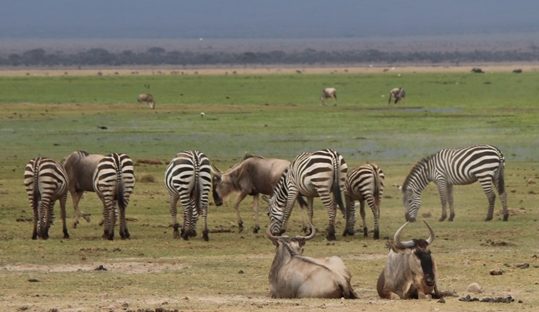
Amboseli National Park famously referred to as “the home of Elephants” because of the massive elephant herds is one of the iconic safari destinations of Kenya. Amboseli has been marketed by Kenya as the best place to see the Kilimanjaro Mountain (the mountain is on the Tanzanian side), being located right below Africa’s tallest mountain which forms an epic backdrop to the stunning open wilderness of Amboseli National Park that is filled with animals including one of the biggest population of Elephants in Africa. A shot of the African Elephant strolling the plains of this beautiful wilderness, against a backdrop of the snow-capped Kilimanjaro, is one of the trending photos of an African safari vacation. And, while most tourists visit Kenya to go to Masai Mara which is the prime destination, however, a safari in Kenya without a trip to Amboseli cannot be a complete safari in Kenya!
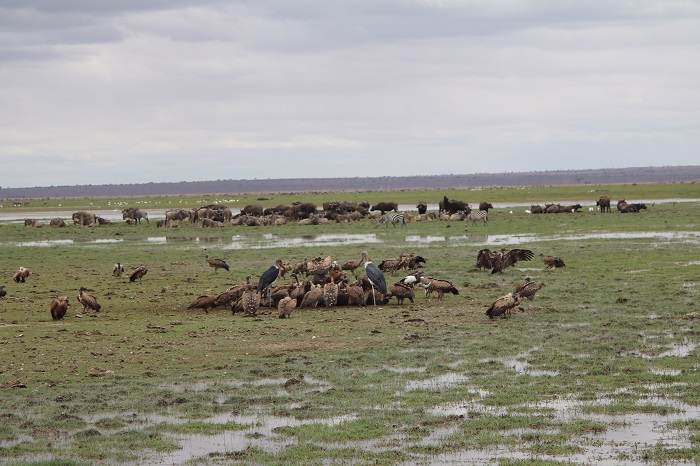
Measuring just 390 square kilometers, Amboseli National Park is located in the south of Kenya, approximately 5 hour’s drive from the capital Nairobi. Amboseli sits below the leeward side (rain shadow) of Kilimanjaro Mountain which leads to the dry weather and creating desert like condition of the park. In fact, Amboseli is a Maasai word meaning “salty dust” During the long dry spells when the leeward side receives no rains at all, the park becomes a vast area of dried out grassland – almost likes a soccer field. However, Mountain Kilimanjaro contributes many rivers which flow underground and create large swamps and marshes and small lakes in the now desert habitat of Amboseli during the dry season. During this dry season, the swamps become an oasis of life where many of the animals go to graze and drink water. For the cats, it become even easier to find prey which are all squeezed around marshlands and swamps.
When the rains come, the park gets a new look of lush green. The wildlife also spreads out to all areas of the park. The swamps expand and become lakes and the low areas fill up too forming shallow lakes. The lush greenery, sparkling lakes and the stunning backdrop of the Kilimanjaro Mountain whose white snow now expands to nearly half way the mountain, is quite a sight to behold!
adventure and sightseeing
Wildlife & Activities in Amboseli National Park
Wildlife in Amboseli National Park
Amboseli National Park is a surprise gem when it comes to wildlife, so much so that many people who have visited the much more popular Masai Mara wonder if Amboseli offers better sightings of most animals. The desert-like conditions which force animals to gather around the water and green spots during the dry spells make finding wildlife easy and offer great close-up sightings.
The only missing member of the famous Big Five animals is the Rhino, but all the other members; Elephant, Leopard, Buffalo and Lion, are present in Amboseli National Park. The elephant is the iconic animal of the Amboseli and is one of the best places on earth to see Elephants due to the huge population.

Amboseli is Hyena country! With plenty of prey to feast on, you will see many hyenas (Spotted Hyena) lazing up in the marshes and on the shores of swamps in the afternoon after filling up their belies from a morning successful hunt.
Other common animals you will not miss seeing in Amboseli include wildebeest, zebra, Masai giraffe, Thompson’s gazelle, Grant’s gazelle, reedbuck, and warthogs.
The park also has the unique Yellow Baboons, a different species from the olive baboons you may have seen, found almost everywhere else.
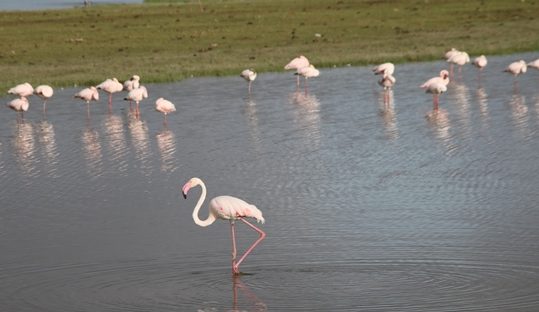
Are you a birdwatcher? Bird life in Amboseli National Park is prolific! The lakes, open swamps and marshes provide one of the best wetland and water birding experiences as many species of water birds are easily side from the drive tracks. The gigantic Goliath Heron can be seen from many miles away. The lakes are filled with flamingos. Other habitats such as the grasslands, savannah, woodlands, and forest add to the variety of birds in Amboseli National Park.
Things to do in Amboseli National Park
Game drives in Amboseli
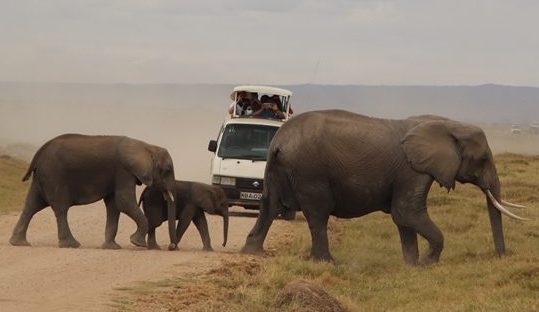
The game drive is the most popular and best way to explore the Amboseli National Park. There is a good network of drive trails throughout the park going along the swamps and marshes where a lot of wildlife can be seen.
The game drive in Amboseli lasts a full day starting at 7 am till 6 pm, you will have to go out with a lunch pack.
You will be able to access most areas of the park during the dry season, however during the rainy season the swamps and lakes overflow and cut off many areas of the park and the game drive will be limited in a few dry areas.
Balloon safari in Amboseli
Amboseli National Park offers one the best Balloon Safari experiences, offering incredible views of the breathtaking wilderness and especially great views of the Kilimanjaro mountains and the magical African sunrise.
The Balloon Safaris start at 5 am, and the flight will take about one hour over the Amboseli.
The balloon safari will enhance your wildlife experience as you will access areas that are not reachable by car thereby increasing your chances of seeing more wildlife.
After the balloon safari, you will continue with the game drive at about 7 am.
Picnic on the Observation Hill
The Observation Hill is a picnic spot in Amboseli National Park that provides panoramic views of the plains below and stunning the peak of Kilimanjaro Mountain in the background. Hiking to the observation hill is normally a climax of the safari drive in the park where you go to relax and enjoy your lunch while taking the incredible views from up there.
It is a light hike that does not need any fitness levels. There are steps to the top.
Bird watching in Amboseli National Park
Amboseli National Park is one of the best, if not the best, birding destinations of Kenya boasting a whooping 600 species of birds. The diverse habits and the good trail network around the marshlands, swamps and lakes provide a good birding experience with closer views of many birds.
Wetland and water birding is at its best in Amboseli National Park as you can see many local species. You will be able to see the flamingos, herons, ducks, ibises, storks, cormorants, lapwings, plovers, egrets, etc…
The Goliath Heron and Great Egret easily stand out in the open marshlands and can been seen many meters away.
The open plains, savannah and woodlands provide plenty of birds, more so those birds of the semi-arid region.
The Ostrich and Secretary Bird can be seen strolling through the open field.
The trees host plenty of White-headed Buffalo-Weavers and White-browed Sparrow-Weavers.
Amboseli offers one of the best sightings of the rare Taveta Golden Weaver.
The park is great for birds of prey as well, and if you are looking for vultures you will not search so much as you will crowds of them at leftover kills, along with eagles and storks hoping to find a few pieces left after the rowdy vultures have had their fill.
Maasai community tour
As part of your safari trip to Amboseli, you should include a tour of the Maasai community to experience their way of life and learn about their cultures and traditions. A Maasai man will take you around the village, show you how the man makes fire using sticks, and explain the homestead of traditional Maasai homestead.
Best views of Mount Kilimanjaro in Tanzania
The epic views of the Kilimanjaro mountain of Tanzania are one of the highlights of the trip to Amboseli. The world’s tallest free-standing mountain creates a stunning backdrop to the landscape of Amboseli. One of the best pictures taken on an African safari is one of the massive elephants strolling the plains of Amboseli with the snow-capped Kilimanjaro in the backdrop.
Best time to visit Amboseli National Park
You can visit the Amboseli, either during the long dry season or during the rainy season.
The long dry season from June through to October (and the short dry season Jan – Feb), is a good time to visit Amboseli National Park because the drive tracks throughout the park are drivable. Also, during this time a lot of wildlife is easy to find because it is concentrates around the water sources and green spots.
However many large mammals like the Elephants will migrate to the neighboring Tsavo West and Tsavo East in search of the more vegetation to feed on.
The rainy season (March to May & Nov – Dec), on the other hand, though muddy and may prohibit the drive to different areas of the park brings a stunning scenery and the biggest herds of elephants you have seen in a single spot. Also, the best views of the Kilimanjaro Mountain are during the rainy season when there is a bigger snow cover!
Lodges/hotels near Amboseli National Park
Some of the nice accommodations we can recommend for your stay in Amboseli are:
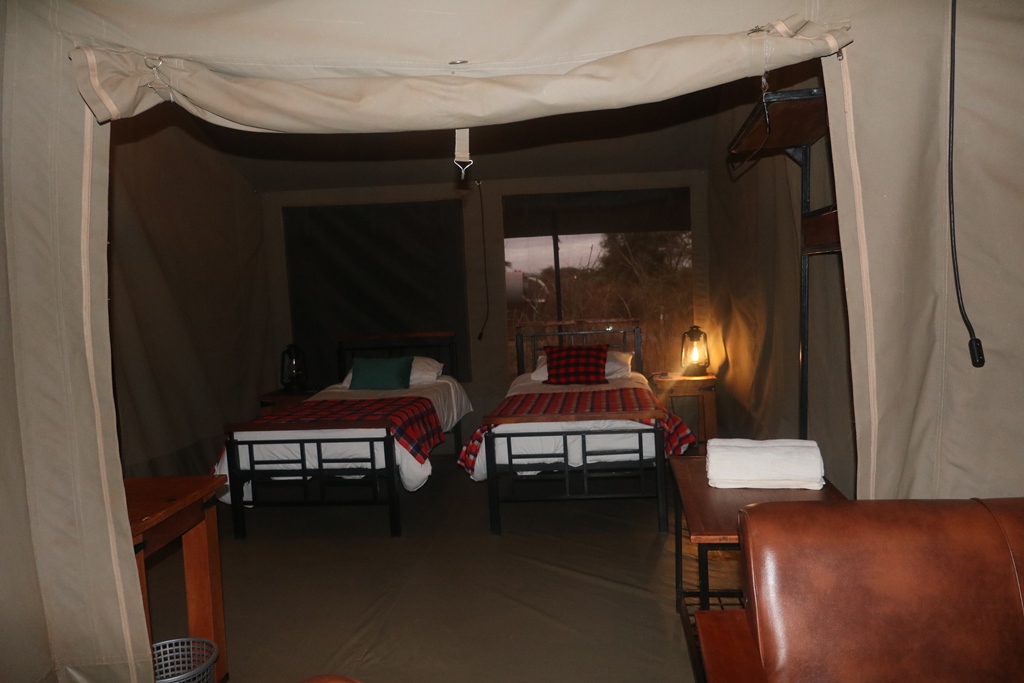
Amboseli Serena Safari Logde
Tulia Amboseli Safari Camp
Book a safari trip to Amboseli National Park




